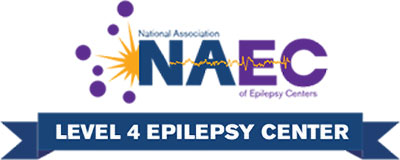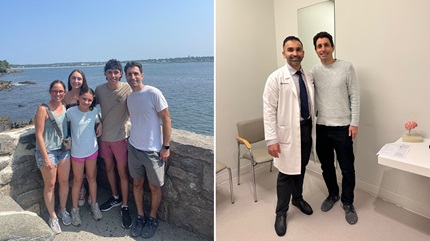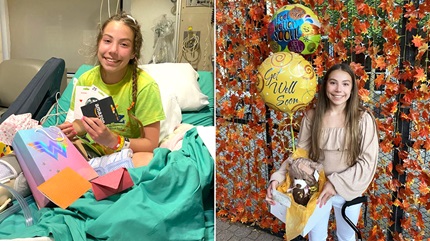Overview
Cleveland Clinic has one of the largest, most comprehensive programs in the world for the evaluation, medical and surgical treatment of epilepsy in children and adults, managing more than 10,000 patients every year. We are committed to our epilepsy patients -- providing excellent clinical management and applying advanced diagnostic and therapeutic techniques and approaches.
Program highlights for our Epilepsy Center include:
- State-of-the-art diagnostic technologies and surgical treatment options including elaborate electroencephalogram (EEG) monitoring with simultaneous videotaping (video EEG monitoring), sophisticated implantable electrodes (SEEG), functional magnetic resonance imaging (fMRI), magnetoencephalography (MEG), ictal single photon emission computed tomography (SPECT), and deep brain stimulation (DBS). Artificial intelligence-assisted multi-modality integration analysis is used to layer these imaging and neurophysiological modalities for a higher certainty of localizing the seizure. Identifying (or localizing) the seizure location enables creation of surgical plans leading to improved patient outcomes in seizure freedom.
- Our epilepsy surgeons have performed more than 7,000 surgeries since 1996. One year after temporal lobe resection, 80 percent of Cleveland Clinic patients continue to be seizure-free; at the 10-year mark, 60 percent continue to be seizure free. On average we perform approximately 350 epilepsy surgeries each year, making our Surgical Epilepsy Program one of the foremost programs of its kind in the world.
- Comprehensive research programs for innovative diagnostics, therapeutic tools and devices for the management of the most complex epilepsy in adults and children.
- The Epilepsy Center has been treating patients virtually since 2014, offering safe and convenient virtual visits by video on your mobile device, tablet or computer.
- Not up to seeing your provider in person? The Epilepsy Center also offers virtual visits. This convenient alternative to an in-person appointment lets you meet with your provider from the comfort of home using your smartphone, computer or tablet and EEG testing equipment we send to your home.
- Our team of dedicated pediatric and adult neurologists; neurosurgeons; neuroradiologists; nuclear medicine physicians; nurse specialists; pharmacologists; physical, occupational and speech therapists; dietitians; neuropsychologists and psychiatrists; educational counselors and social workers; and an array of scientists and technologists all work together in a multidisciplinary approach to offer individualized epilepsy care to adults and children.
What We Treat
Diseases and Conditions
Focal Seizures
- Frontal Lobe Seizures.
- Temporal Lobe Seizures.
- Occipital Lobe Seizures.
- Parietal Lobe Seizures.
- Multi-lobar Seizures.
Generalized Seizures
- Absence Seizures (petit mal seizures).
- Atonic Seizures.
- Myoclonic Seizures.
- Tonic-Clonic Seizures (grand mal seizures).
Cause of Focal Seizures
- Malformations of Cortical Development (MCDs)
- Classical Lissencephaly.
- Focal Cortical Dysplasia.
- Hemimegalencephaly.
- Subcortical band heterotopia.
- Periventricular nodular heterotopia.
- Polymicrogyria.
- Tuberous Sclerosis Complex.
- Tumors
- Dysembryoplastic Neuroepithelial Tumor (DNET).
- Gangliogliomas.
- Hypothaloamic Hamartomas.
- Vascular Malformations
- Carernomas.
- Sturge-Weber Syndrome.
Diagnostics & Testing
- Epilepsy Monitoring Units.
- Invasive EEG Monitoring.
- Laboratory Tests.
- Magnetic Resonance Imaging (MRI).
- Manetoencephalograpahy (MEG).
- Positron Emission Tomography (PET).
- Single-Photon Emission Computerized Tomography (SPECT).
- Stereoelectroencephalography (SEEG).
Treatments & Surgery Options
- Corpus Callosotomy.
- Deep Brain Stimulation (DBS).
- Hemispherectomy.
- Ketogenic Diet.
- Laser Interstitial Thermal Therapy (LITT).
- Lesionectomy.
- ResponsiveNeurostimulation (RNS).
- Vagus Nerve Stimulation.
Pediatric Epilepsy Program
Our Pediatric Epilepsy Program includes six board-certified pediatric epileptologists, an epilepsy neurosurgeon, pediatric neuroradiologists, clinical neurophysiologists, pediatric neuropsychologists, and a dedicated team of pediatric nurses, nursing assistants and EEG technologists.
Each year, our team sees more than 3,000 children with pediatric epilepsy in our outpatient clinics, and evaluates more than 550 children in our dedicated state-of-the-art Pediatric Epilepsy Monitoring Unit. More than 100 children with severe conditions undergo epilepsy surgery annually, making Cleveland Clinic's Surgical Pediatric Epilepsy Program one of the foremost programs of its kind in the world.
- To learn more, visit our Pediatric Epilepsy Program.
The Epilepsy Center is accredited by the NAEC as a level 4 epilepsy center. Level 4 epilepsy centers have the professional expertise and facilities to provide the highest level medical and surgical evaluation and treatment of children with complex epilepsy.
Not up to seeing your provider in person? The Epilepsy Center also offers virtual visits. This convenient alternative to an in-person appointment lets you meet with your provider from the comfort of home using your smartphone, computer or tablet and EEG testing equipment we send to your home.
Adult Epilepsy Program
Our adult epilepsy team includes 14 board-certified epileptologists, an epilepsy neurosurgeon, neuroradiologists, clinical neurophysiologists, neuropsychologists, and a dedicated team of nurses, nursing assistants and EEG technologists.
Testing for adults with epilepsy may include:
- 7-Tesla magnetic resonance imaging (7T MRI) is a sophisticated radiologic technique that uses harmless magnetic waves (rather than X-rays) to produce images.
- Magnetoencephalography (MEG) is an advanced method of recording and evaluating the brain while it is actively functioning.
- Positron emission tomography (PET) is a procedure that shows changes in brain metabolism associated with seizures.
- Single-photon emission computed tomography (SPECT) is a test that measures blood flow in the brain and how this flow changes with seizure activity.
What does a presurgical evaluation involve?
- Functional magnetic resonance imaging (fMRI) is a type of MRI that locates the functional areas of the brain (e.g., speech, memory, areas of motor control, sensation and vision).
- Artificial intelligence-assisted multi-modality integration analysis is used to precisely identify and/or confirm the areas of the brain where the seizure(s) originate. By layering multiple imaging and neurophysiological modalities like MRI, CT, PET, SPECT, MEG, EEG and SEEG there is a higher certainty of localizing the seizure. Identifying (or localizing) the seizure location enables creation of surgical plans leading to improved patient outcomes in seizure freedom.
- Neuropsychological evaluation is an extensive battery of IQ and memory tests designed to aid in localizing areas of impaired function in the brain that may be used for some patients during pre-surgical evaluation.
- Psychosocial evaluation is a screening process that aids in identifying any pre-existing psychological or lifestyle disturbances that could interfere with quality of life or the benefits of surgery.
Adult Epilepsy Monitoring Unit
Each year, our internationally renowned team of physicians and medical professionals sees more than 7,800 unique patients (new and follow-up), ages 18 years and older, in our epilepsy outpatient clinics and evaluates more than 1,000 patients, in our dedicated state-of-the-art Epilepsy Monitoring Unit.
Our monitoring unit includes 23-beds featuring state-of-the art, all digital video-EEG monitoring equipment and is fully staffed 24 hours a day, seven days a week.
Our clinicians use a variety of medical and surgical treatment options for the control and prevention of seizures. Treatments are based on an individualized assessment of the nature, type and severity of the patient’s disorder.
The Epilepsy Center is accredited by the NAEC as a level 4 epilepsy center. Level 4 epilepsy centers have the professional expertise and facilities to provide the highest level medical and surgical evaluation and treatment of adults with complex epilepsy.
Not up to seeing your provider in person? The Epilepsy Center also offers virtual visits. This convenient alternative to an in-person appointment lets you meet with your provider from the comfort of home using your smartphone, computer or tablet and EEG testing equipment we send to your home.
Surgical Epilepsy Program
Surgical Epilepsy Program
When medications are unable to control seizures, Cleveland Clinic’s Epilepsy Center team performs a careful evaluation to determine the best alternatives for treatment.
Today, surgery has become a treatment option for many adults and children with medically intractable epilepsy — more than50 percent of epilepsy patients for whom appropriately prescribed anti-seizure medication is either ineffective or produces intolerable side effects.
Types of epilepsy surgery include:
Surgical Resections
- Lesionectomy (removal of small brain abnormality that is causing seizures) is performed to remove isolated lesions, such as tumors or congenital malformations of blood vessels in the brain that have been identified as the primary seizure focus. Leading-edge stereotactic (three-dimensional) imaging and surgical localization techniques are often used to further aid the surgeon in defining the specific area to be resected and can help limit the size of the incision required for the resection.
- Lobectomy (removal of a part or an entire lobe of the brain) is an operation to remove part or all of a lobe. Generally, seizures that originate in either of the two temporal lobes (one on each side of the head, just above each ear) are complex partial seizures. Anterior (front) and mesial (deep middle) temporal lobe resections are the most common of all epilepsy surgical procedures. Operations to remove sections of other lobes are also possible, providing tests show that no vital functions are controlled by these areas.
Ablation
- Laser Ablation (LITT) is used to remove tumors and other epileptic lesions. Surgeons use magnetic resonance imaging (MRI) to guide the use of laser interstitial thermal therapy (LITT). The laser, or tiny probe uses controlled heat to target and destroy scare tissue in the region of the brain where the seizures originate from.
Neuromodulation
- Deep Brain Stimulation (DBS)is a surgical procedure that involves implanting electrodes in the brain, which deliver electrical impulses that block or change the abnormal activity that cause symptoms.
- Responsive Neurostimulation (RNS) isan adjunctive therapy for reducing the frequency of seizures which can’t be controlled with medication or surgical resection. The RNS System consists of a small, battery-powered neurostimulator that is placed in the skull and is connected to leads (thin wires with electrodes) that are placed in the area of the brain where your seizures start. These pulses are intended to disrupt the abnormal activity and reduce seizure frequency.
- Vagus Nerve Stimulation (VNS) is a treatment for epilepsy that involves a stimulator (or pulse generator) which is connected, inside the body, to the left vagus nerve in the neck. The stimulator sends regular, mild electrical stimulations through this nerve to help calm down the irregular electrical brain activity that leads to seizures.
Disconnected Surgeries
- Functional hemispherectomy involves removing a portion of the brain’s hemisphere. The remaining tissue and fibers that communicate with the other side of the brain are disconnected.
- Anatomic hemispherectomyinvolves removing the entire half of the brain, including the frontal, parietal, temporal and occipital lobes. Deeper brain structures, such as the basal ganglia and thalamus, are left in place.
- Peri-insular hemispherectomy involves disconnecting certain fibers, interrupting the communication network of the affected brain hemisphere.
- Corpus Callosotomyis a surgical procedure for medical retractable epilepsy that involves cutting the corpus callosum to interrupt the spread of seizures between the two hemispheres (sides) of the brain.
Our Doctors
Looking for an epilepsy specialist?
Our ProvidersAppointments
Make an Appointment
To make an appointment with an Epilepsy Center specialist in Ohio and Florida, please call:
- Ohio - call 216.636.5860 or 866.588.2264.
- Florida - call 954.659.5671 or 866.588.2264.
Virtual Visits
Whether you're a new or existing patient, you can get an initial evaluation or follow-up care from an epilepsy center specialist using your phone, tablet or computer. Our virtual offerings are customized for you and may include:
- Your initial visit with a board-certified epileptologist.
- At-home video EEG-monitoring with remote reading done by a registered EEG technologists and epileptologist.
- Follow-up appointment after your at-home video-EEG monitoring with diagnosis and recommendations for additional test(s) and/or next steps for managing your epilepsy or seizures.
- Pre-surgical planning appointment with a neurosurgeon.
- Follow-up appointments with your established epileptologist and/or advanced practice nurse.
This means there's no travel or parking, less waiting and significant time savings. Call 216.636.5860 to schedule a virtual visit for you or a loved one and get details on cost and set-up instructions.
MyChart
MyChart connects you to your health care team from the comfort and safety of home. With this secure, online tool you can manage your appointments and complete pre-visit tasks, communicate with your providers, and keep track of your test results and medications.
Locations
What to Expect at The Epilepsy Center
What can I expect during my first appointment?
Your preliminary evaluation is performed by a board-certified neurologist with subspecialty training in epilepsy. It includes:
- A detailed history of your seizure activity and antiseizure medications to help define the type of epilepsy you have and to determine the following:
- Are you experiencing a new onset of seizures?
- Have you been previously diagnosed with epilepsy?
- Is your epilepsy resistant to medications?
- Outpatient testing to screen for abnormalities within the brain
- Inpatient EEG recordings to identify where, within the brain, the seizures begin
Your doctor will also need to know about a family history of seizures or other similar conditions and medications prescribed.
What questions is my doctor seeking to answer?
If you are evaluated for suspected seizures or epilepsy, your doctor will work to answer these questions:
- Have you had an epileptic seizure or something else?
- What is the cause? If a cause is identified, can it be treated?
- What is the seizure type?
- What is the outlook?
During your first appointment you will meet with members of our Epilepsy Team. They will take your medical history, perform a physical examination and complete a series of neurological and blood tests. Although your tests will be performed as quickly as possible, you should expect some waiting; you may want to bring some reading material to help pass the time.
What do I need to bring to my first appointment?
Your past medical record is very helpful to us. On the day of your appointment, please bring your actual test results of any MRI, CAT or CT and/or your EEG records that relate to your medical condition. Also, if you have recently been in the hospital (other than Cleveland Clinic), please bring a copy of your hospital discharge summary sheet, as well as other relevant hospital information. Your local physician can help you obtain these items.
What questions should I be prepared to answer at my first appointment?
Important questions that you should prepare for include:
- At what age did the seizures begin?
- What circumstances surrounded your first seizure?
- What factors seem to bring on the seizures?
- What do you feel before, during and after the seizures?
- How long do the seizures last?
- Have you been treated for epilepsy before?
- Which medications were prescribed and at what dosages?
- Was the treatment effective?
If other individuals have seen you during a seizure, such as family members or close friends, they should be present to provide details because you may not have been aware of what was happening.
What testing will occur?
Testing may include outpatient EEG, EEG monitoring, MRI, PET, SPECT, neuropsychology evaluation etc.
If video-EEG monitoring is needed, how long will the stay be?
Patients are monitored in private rooms, monitoring may extend for several days so that brain waves can be examined during and between seizures.
For adult patients, one guest may stay with the patient around-the-clock. For pediatric patients, parents are encouraged to stay around-the-clock with their child, though only one person may stay overnight. After monitoring is completed, young patients are welcome to use the playroom and playdeck. The playroom and playdeck are located in Cleveland Clinic Children’s Hospital, where the Pediatric Monitoring Unit is located.
What will I take home with me after the evaluation?
At the end of the evaluation, the physician will provide you with a summary impression from the information gathered from the testing and provide further recommendations for a treatment plan. Within the following few days, your referring physician (unless otherwise specified) can expect to receive a copy of the complete evaluation and further recommendations which may include medication adjustment, surgical options and/or further testing.
Epilepsy is a disorder that needs very close follow-up care on an ongoing basis. We like to work very closely with your referring physicians in providing them with feedback and future recommendations whenever needed. In many cases, medication levels and prescriptions are best handled by a follow-up closer to home with the regular physician. However, we would like to stay available for further consultation and follow-up visits at any time in the future.
Clinical Trials & Research
Epilepsy Research Programs
The Neurological Institute advances research into diseases of the brain and spine and conducts clinical therapeutic trials to support patients with neurological disorders. Our multidisciplinary research collaboration combines the expertise of clinical principal investigators with state-of-the-art imaging and data analysis to establish and implement new approaches to the treatment of neurological diseases. In addition, the Neurological Institute trains clinical fellows, full-time research fellows and residents as next generation clinical research scientists.
Clinical trials and research are the key to advancing medical knowledge and patient care. They provide hope by testing new drugs, new surgical techniques or other treatments before they are available.
Cleveland Clinic Brain Study
What happens to the brain and body before a neurological disease is diagnosed? Cleveland Clinic's Brain Study will change the landscape of neurodegeneration science. By researching at-risk normal individuals over the course of 20 years, we will learn what is happening to the brain and body before a neurological disease is diagnosed. Help us realize a future without neurological disease.
Medical Professionals
Refer a Patient
The Epilepsy Center offers direct referral lines to ease the process of making a patient referral.
To refer a patient to the Neurological Institute via phone, please call our dedicated physician referral hotline at 216.445.8455. An intake coordinator will handle your call directly. If you are unable to reach an intake coordinator, please leave a message and they will return your call within the work day (if left before 1 p.m. ET) or the next work day (if left after 1 p.m. ET).
To refer a patient to the Neurological Institute via fax, please download and complete our physician referral form and fax to 216.636.2596.
MEG Testing
The Epilepsy Center offers direct referral lines to ease the process of making a patient referral.
If you are a provider and would like to make an appointment for your patient to have a magnetoencephalography (MEG) test completed by Cleveland Clinic’s Epilepsy Center team, please download the MEG Scheduling Form below and follow the prompts at the end of the form for submission.
DrConnect
Stay connected to patients you refer to Cleveland Clinic through online updates and electronic medical records.
- Learn More.
- Sign-up or Log in.
EEG Technologist Training Program
The School of Epilepsy Technology offers an ABRET- recognized, 12-month training program for electroencephalogram (EEG) technologists. Enrollees receive on-the-job training from Cleveland Clinic epileptologists and registered EEG technologists. Participants are employed by Cleveland Clinic, and are provided with knowledge and hands-on clinical experience to prepare for the ABRET Registered EEG Technologist exam. The training program includes an introduction to the field, an overview of the brain, the role of a technologist and training on the procedures used to monitor a patient’s brain and nervous system.
Becoming a registered EEG technologist is only the first step in a long-term career in the epilepsy technologist field. Career advancement can include becoming an EEG reader, magnetoencephalography (MEG) technologist, intra-operative monitoring technologist, and trainer of future EEG technologists.
Training
We offer best-in-class clinical neurophysiology training to adult neurology residents and pediatric neurology fellows.
The Epilepsy Center has gained national and international prominence for the management and investigation of epilepsy and offers excellent training for medical professionals. Our high-volume clinical practice attracts adult and pediatric patients from all over the world.
Our coordinated, multidisciplinary team contributes a comprehensive range of skills and knowledge of adult and pediatric epilepsy. Excellence in diagnostics, medical and surgical clinical treatment programs, and research have yielded important basic and clinical science contributions.
We invite both adult neurology residents and pediatric neurology fellows considering clinical neurophysiology training to consider Cleveland Clinic for your further training.
Visit the Cleveland Clinic Epilepsy Fellowship webpage for further details and application materials.
Resources
Lifestyle interventions for epilepsy
If you have epilepsy, stress is a commonly reported trigger for additional seizures. And while the main treatment for epilepsy is anti-seizure medication, about a third of people with epilepsy still also have additional seizures despite taking their medication.
There's evidence suggesting that incorporating lifestyle activities like meditation, yoga and breathing exercises may reduce stress and enhance overall health. And those new lifestyle practices — when combined with the standard treatment of your epilepsy — may help you control the seizures, improve your mental health and enhance your quality of life.
There are many healthy ways you may choose to cope with stress. Our goal is to find out what works best for you. Explore the following options to begin your journey toward improving your wellbeing.
Meditation and Breathing Exercises
Meditation is a practice in which you focus or clear your mind through a combination of mental and physical techniques. There are several types of meditation, but most include sitting quietly, paying attention to your breath and to your thoughts or sensations. The goal is for you to achieve a calm awareness. This can help reduce stress, improve your concentration and your overall well-being.
Yoga
Yoga is a holistic practice that involves a wide range of mind-body actions. Those actions include meditation and relaxation, breathing techniques, physical poses and being mindful of certain philosophical principles. While researchers are still studying the benefits of yoga for managing epilepsy, there is some research suggesting it may benefit in controlling seizures and in improving overall quality of life. Yoga can be adapted to fit your needs — you can even try out chair yoga to see if it works better for you.
Music Therapy
Music therapists use music — including elements of music like sound, rhythm and harmony — to help you accomplish goals like reducing stress, enhancing memory or improving your quality of life. Some studies suggest that music therapy may reduce epilepsy-related abnormalities on EEG and may have an impact on reducing your seizures.
Cognitive Behavioral Therapy
Cognitive Behavioral Therapy (CBT) is way in which a therapist can help you understand your beliefs, thoughts and behaviors to build and improve strategies for coping and managing your stress. Mental health conditions like anxiety and depression affect 25-50% of people with epilepsy. But CBT can help you cope and give a greater sense of hope and empowerment. If you're considering CBT, talk to your provider to talk about how it might benefit you.
These Cleveland Clinic videos are made possible by the generosity of The Charles L. Shor Foundation.



